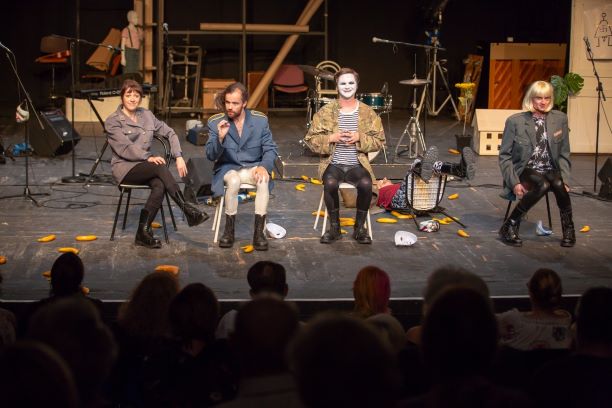54 Borstnik Theatre Festival, Maribor, Slovenia
What can lead us out of the crisis? From the coronavirus pandemic and police brutality and apparent existential problems of millions and millions who lost jobs, to the marginalization of minority communities around the world. lf the political leadership is broken and it is reflected properly in the theatre, we may devoid the humility and ignore inclusivity, but on a right way, we could give the thought to narcissism, where the politicians of the world are gambling with public health, safety and the future of everyone, where the self-serve is unapologetically prioritize. Thinking now the issue of it was clear on the last theatre festival I attended, before the coronavirus lockup at the beginning of 2020, The 54th Borštnik Theater Festival in Slovenia/Maribor connected to the world’s latest terror relating coronavirus with a rise of fascism in Europe. But lets take a look at the broad contextualization of the political concerns that brings up the special issue of anti-fascism in the theatre. Over a decade after the global financial crisis, we find ourselves confronted with a complex, transnational ideological and material reality where identifiable traits of fascism command raising our consciousness about strategies of resistance and basic survival. Where is the critical research in the art/theatre field that aids, and indeed become part sustainable resistance of the individual? Where is the urgency and necessity for anti-fascism as a material practice in the art and theatre? There are ideas of narratives around fascism and its relation to capitalism and also how to address totalitarianism, populism etc.
At the 54 Borštnik Theatre Festival, Slovenian theatre director Boris Nikitov had his theatre production “The Opposition of Things/Nasuprotje stvari” with Slovenian Youth Theater from Ljubljana where he takes a serious approach to the pro-fascist value system as a problem of contemporary Slovenian society. It is a matter of satire and pomp in the skeleton of neo-fascism in easy and above all understandable theatre production. This Slovenian production Boris Nikitov’s production caricatures far-right ways of thinking with actors in clown costumes, where the space of engaged political theater at least for a moment becomes revealed, refined space of reflection, enriched with satire. In this production, the characters, although caricatured, interpret without emphasis. There is no forced acting or brutal lynching of the theater, which is a great success when it comes to a great satire on stage. Nikitin is talking about the ominousness of political tendencies in Slovenia. Slovenia’s integration into the EU is criticized here along with desperate snobbery and petty-bourgeois ambition to become a part of EU culture, globalism, and of course materialism at any cost, running after pro-fascist ideals, competing in non-spiritual values, in a very simple way. It is in a clear political context the scene that is actually a real critique of society. Calling fascism is something that we don’t like because it is dangerous because resistance to that ideology diminishes if we call less pernicious views of the world by the same name. Not every nationalism, every autocratic regime, every undemocratic order is fascist. Boris Nikitin’s biography says that for the last ten years he has been especially engaged in the representation and production of reality and identity in politics, economics, and religion. With the “Opposite of things”, he did not deviate much from his ideology. There are five clowns on the stage trying to perform an avant-garde neo-fascist work or are they really, or both, as opposed to themselves? Each of these five clown characters deals with one topic, which they mix with fascism, socialism and thus reveal the mental state of an individual in Slovenia. populism, paranoia, anger, etc … Eg. collective clowning of clowns for “yes, yes” , which in addition to its basic meaning taken as a system of possibilities, in which you think you are fulfilling the civil right of free will, which is actually a finished act and completely contrary to meaning free-will rights. Like reactive depression, each clown speaks his part. If we process the notion of satire, what is the function of satire in our time, and is it conditioned by freedom of speech? Manipulation, paranoia, political depression in which opinion is shaped by a line of least resistance. The basic characteristics of fascism are the class state, nationalism as the glorification of one’s own, and contempt and, if necessary, the destruction of other peoples. Of course, there is also the inevitable cult of the leader in communism. In recent times we call “fascistoid” political systems or movements that take over only some fascistoid elements, but only fragments of these fascistoid elements are sufficient for the self-destruction of the individual. So the question is how much do we recognize fascism in our systems today? A lot, because there is a lot of it. But what better way to portray hidden fascism in society than through the clown mask. The devil in a clown suit does not sleep, it is the Joker of today, the framework given by the anti-communist combination of liberalism and conservatism, ie the bourgeois propaganda of all market-relevant groups in the capitalist / global race of survival. What exactly is resistance today? And where does it come from? Here we are talking about a crisis of nonconformism. And this is a movement that actually exists through its philosophical roots, which is based on German idealism, which changed reality through its own thoughts and representative power. A theatre production “Opposite of Things/Nasuprotje stvari” was accompanied by punk music, so there is resistance, where clowns play 7 instruments on stage. Some have suits and the identity of the opposite sex, while the scenography is scattered around the stage and is reflecting nicely on an inconsistency of fascist ideas.


